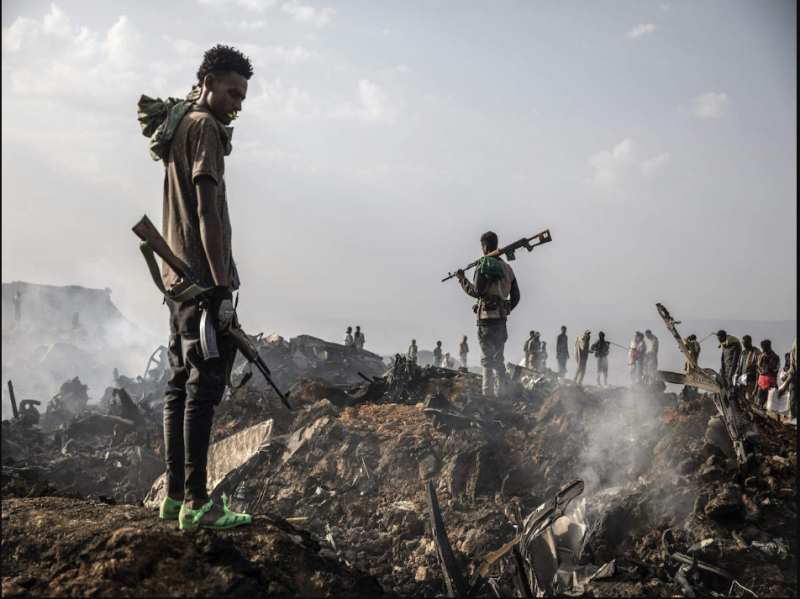
Ethiopia: Tigre officials claimed on Wednesday that Ethiopian forces had launched a "large-scale" offensive into the northern Tigre region for the first time in a year, but the government argued that Tigre forces had attacked first. Millions of people still do not have access to food and other necessities, which is a significant blow to mediation efforts.
In the second most populous country in Africa, conflict broke out in November 2020 and resulted in thousands of deaths. Both sides have acted at a time when the world's attention was diverted, most recently on Wednesday, the six-month anniversary of the Ukraine war.
In recent months, the conflict has subsided amid sluggish mediation efforts. However, Prime Minister Abiy Ahmed's spokesman claimed last week that the Tigreyan government was "refusing to accept peace talks," and this week, the Ethiopian military warned the public about not reporting military activities. issued.
For their part, a letter dated 23 August and signed by Tigre leader Debrection Gebremichael and provided to the Associated Press stated that Tigre leaders had "two sets of confidential face-to-face conversations with senior military and civilian officials". rounds were held" - the first confirmation of such talks. It urged the international community to intervene immediately, saying that "unacceptable conditions have been included in the peace process."
All the parties in the dispute have abused. A World Food Program warehouse in the regional capital of Mekele was "forced entry" by Tigre forces on Wednesday, and 12 fuel tankers were taken for the delivery of desperate humanitarian aid, according to the United Nations.
According to the Tigre Military Command, fighters from the neighboring Amhara region and Ethiopian forces "launched a massive offensive around 5 a.m. in the direction of Almata, the southern Tigre."
According to the Ethiopian government, Tigre forces launched an initial attack. The government further threatened that if the attacks continued, "measures will be taken to save the country ... and bring [Tigre forces] to the negotiating table whether he likes it or not."
The Ethiopian government has said it is open to talks, but remains adamant that the African Union should lead the mediation. Tigre officials criticize the Continental Organization's efforts and call for the immediate restoration of telephone, banking and other services, which have been cut off by some 6 million people since the war began.
An ethnic Tigreyan of the World Health Organization chief Tedros Adhanom Ghebreyesus earlier this month referred to the crisis there as the "worst disaster on earth" and wondered loudly whether the lack of action by world leaders was "for the people". because of the color". In Tigre."
Earlier this year, Tigre began receiving humanitarian aid, but last week the World Food Program said that due to restricted fuel supplies, "this has not yet translated into an increase in humanitarian aid." Malnutrition has "skyrocketed", with 29% of children underweight and 2.4 million facing severe food insecurity, according to the UN agency.
The resumption of hostilities shocked UN Secretary-General Antonio Guterres, who called for an immediate ceasefire, a resumption of talks, "full guarantees of humanitarian access to those in need and the resumption of public services".
Millions of people in the Amhara and Afar regions are affected by the humanitarian crisis, and thousands of tigresses are currently living in refugee camps in Sudan.
The former President of Nigeria, Olesegun Obasanjo, is the AU representative. Like other US and EU envoys who have traveled to Tigre, he has made some remarks about mediation efforts.
As the president of neighboring Kenya, who has attempted to mediate with US support, is preparing to step down, due to concerns from Ethiopia, the fight is resuming.
US Senator Chris Koons, a member of the Senate Committee on Foreign Relations, told reporters after a five-nation tour of Africa, in which he talked about Ethiopia with the presidents of Kenya and Rwanda: "It is one of the most important and the Earth. But a brutal struggle."
Koons, who visited Ethiopia last year as an envoy for President Joe Biden, said, "I actually left Africa two days ago who was somewhat optimistic about the path forward for mediation. So listen to [the renewed fight]." Very disappointing for me."
"I am deeply disappointed that Prime Minister Abiy has not made much progress in delivering on the promises he has made," he said, referring to his promises about media and humanitarian access, among other things.
According to International Crisis Group analyst William Davison, the resurgence of hostilities "is a deafening warning to the major international and regional actors that they must really ensure immediate peace talks." As a result, they should direct lligerents to make all of their demands at the negotiating table rather than as prerequisites for discussions.
Ethiopia House of Fed mulls referendum to create 12th region
AK-203 assault rifles manufactured in Amethi, handed over to indian army
Kiev: Putin should stand in world court trial for starting a war